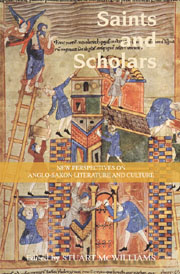 Saints and Scholars
Saints and Scholars Book contents
- Frontmatter
- Contents
- List of Contributors
- Abbreviations
- Introduction
- I Hagiography and the Homiletic Tradition
- 1 A Note on the Sensational Old English Life of St Margaret
- 2 A Place to Weep: Joseph in the Beer-Room and Anglo-Saxon Gestures of Emotion
- 3 Aldhelm's Choice of Saints for his Prose De Virginitate
- 4 Shepherding the Shepherds in the Ways of Pastoral Care: Ælfric and Cambridge University Library, MS Gg.3.28
- 5 “Consider Lazarus”: A Context for Vercelli Homily VII
- 6 More than a Female Joseph: The Sources of the Late-Fifth-Century Passio Sanctae Eugeniae
- 7 Ælfric, Leofric and In Natale Plurimorum Apostolorum
- II Aspects of Community and Consumption
- III Reflections on Old English Scholarship
- Poems
- Hugh Magennis: A Bibliography, 1981–2011
- Index
- Tabula Gratulatoria
7 - Ælfric, Leofric and In Natale Plurimorum Apostolorum
from I - Hagiography and the Homiletic Tradition
Published online by Cambridge University Press: 05 February 2013
- Frontmatter
- Contents
- List of Contributors
- Abbreviations
- Introduction
- I Hagiography and the Homiletic Tradition
- 1 A Note on the Sensational Old English Life of St Margaret
- 2 A Place to Weep: Joseph in the Beer-Room and Anglo-Saxon Gestures of Emotion
- 3 Aldhelm's Choice of Saints for his Prose De Virginitate
- 4 Shepherding the Shepherds in the Ways of Pastoral Care: Ælfric and Cambridge University Library, MS Gg.3.28
- 5 “Consider Lazarus”: A Context for Vercelli Homily VII
- 6 More than a Female Joseph: The Sources of the Late-Fifth-Century Passio Sanctae Eugeniae
- 7 Ælfric, Leofric and In Natale Plurimorum Apostolorum
- II Aspects of Community and Consumption
- III Reflections on Old English Scholarship
- Poems
- Hugh Magennis: A Bibliography, 1981–2011
- Index
- Tabula Gratulatoria
Summary
As part of his campaign to develop a library that met his essentially continental standards of what was appropriate for a bishop, Leofric, who held the see of Devon from 1046 to 1072, first at Crediton and then, from 1050, at Exeter, made a number of very careful additions to an assemblage of regulatory materials in English that had their origins in early-eleventh-century Worcester. These additions, also in English, reveal his appreciation of the purpose of the original manuscript materials, which were texts useful in exercising episcopal responsibilities. If, as is highly likely, this original core of vernacular texts was brought together under Wulfstan, bishop of Worcester 1002–16 and archbishop of York 1002–23, as Wormald has cogently argued, Leofric's subsequent interventions have the added value for modern scholars of demonstrating that he shared something of Wulfstan's interest in raising the standards of the secular Church. The manuscript in question survives now as Part B of Cambridge, Corpus Christi College, MS 190 (pp. 295–420). In its present form it is physically linked with a similar collection of regulatory materials in Latin: Part A of the same manuscript. Ker believed that the Latin and English materials were unified in one codex in the eleventh century, which would make Leofric the likely instigator, once he had made his additions, although this cannot finally be proved. What is beyond doubt, however, is that Leofric recognised that these two assemblages were effectively companion collections, and he treated them accordingly.
- Type
- Chapter
- Information
- Saints and ScholarsNew Perspectives on Anglo-Saxon Literature and Culture in Honour of Hugh Magennis, pp. 112 - 122Publisher: Boydell & BrewerPrint publication year: 2012


